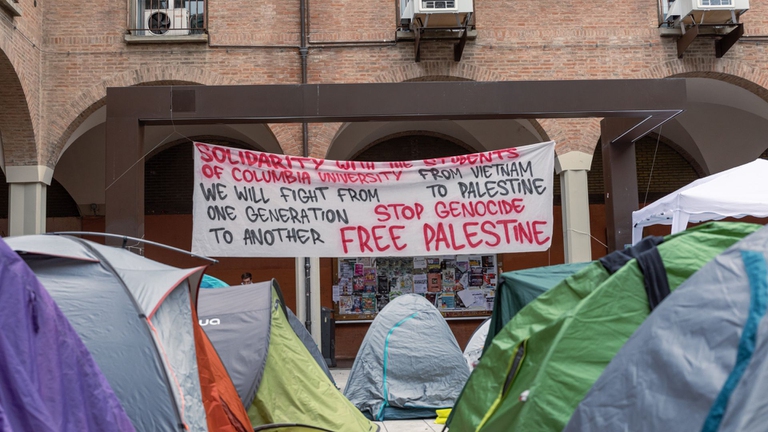https://www.lifegate.it/no-ponte-manifestazioni-italia
- |
It had been understood for some time that certain types of demonstrations were targeted by the security crackdown.From Latest generation to the “No Tav” movement, passing through the pro protests Palestine, the attention of political leaders for street dissent has gradually concentrated.
After months of repression of demonstrations, the news arrived of the approval by the Justice and International Affairs Commissions of an amendment which was promptly renamed “No bridge” inside the security bill currently being examined by the Commissions, and which should arrive in the Chamber in the first days of August.The amendment in question, wanted by the Northern League Igor Iezzi, provides for an aggravating circumstance that stiffens the penalties for those who demonstrate against great works.
What does the safety bill say
Specifically, it is expected an increase in sentence if “the violence or threat is committed with the aim of preventing the construction of a public work or strategic infrastructure”.The call to mobilize against the construction of Messina bridge is immediate, as well as the protests of the "No Tav" movement and similar which, in fact, support environmental protection and local communities by trying to prevent the construction of infrastructures whose usefulness is often the subject of discussion.
The bridge over the Strait of Messina, for example, represents more political continuity and a desire to build an infrastructural legacy, rather than real support for Sicily which, let us remember, is in a rather precarious state, with water rationing and problems in the internal transport network.A concreting like that which could be hypothesized for the bridge it would drastically affect the health of the strait's ecosystem and it would entail economic and energy expenditure, starting precisely from water waste, which the "No bridge" movement denounces and would like to stop.
The aggravating circumstance initially proposed was actually higher than the one that then passed, an increase of two thirds of the sentence:during the discussion it was then decided to increase the sentence "only" by a third, with the possibility of mitigation due to extenuating circumstances.After twenty years of protests against the bridge over the Strait, the legal framework has arrived aimed at reducing them, discouraging participation and establishing within what limits is it allowed to demonstrate.The "No bridge" amendment, moreover, risks having a much larger and more complex aftermath.In fact, we are talking about “strategic infrastructures”, a definition potentially loose enough to allow the inclusion of different types of constructions, including military ones.The bill, by including this amendment, could not only target the "No bridge" and "No TAV" movement, but also the "No Base" movement and all groups opposed to the erection of new military bases.A perspective that fits into an already complex panorama in which different instruments of justice are being adapted for increase the penalties imposed to environmental activists, as in the case of the devices anti-mafia And anti-terrorism.
The risk of new security measures
The substantial risk is that, in addition to making it difficult for those demonstrating to do so safely and freely, yes reduce participation volumes.A danger denounced by the No Bridge movement itself.
The government's objective is this:intimidate not so much us militants but the great masses.And this is even more serious because it is clear that in this way they want to deny people from participating in public life, thus relegated only to elections.The risk is that the many citizens who participate in our demonstrations may feel intimidated.We will have to take them into account, protect them.We will have to open a political battle that aims to reopen the spaces of usability that the government intends to close.
The Security Bill represents in itself a form of legislative tightening and on multiple levels, as specified the lawyer Ricciuti:“For the umpteenth time, the response of this majority is the indiscriminate tightening of penalties for common crimes, which do not cause particular social alarm.We remember that the national prisons are not able to guarantee dignity and prospects of real re-education and social reintegration, it is no coincidence that suicides among prisoners are on the increase.This would be a good time to experiment alternative solutions, rather than focusing on the increase in cases of imprisonment.Even more serious is the fact that this regulatory intervention does not remain isolated but is part of a more complex plan, which starting from the repression of raves, passing through “ecovandals” and arriving at no-bridges, it aims to anesthetize every form of dissent.A security trend that cynically shows itself to the detriment of the weakest, such as pickpockets who could end up behind bars even if they are pregnant or have children under one year old, with all due respect to the protection of the family and minors, which is passed off as a key element of right-wing policies.They call it democracy, yet upon closer inspection, basic rights, which we thought were guaranteed, are slowly being eroded, to the point of ending up in prison for taking part in a protest against a public work."

The reduction of the space for exercising the right to protest reports an attempt to proceed, by the government, with works and proposals even when in complete contrast with the popular will, thus denying the specific territorial demands and the needs of those who live and pass through those places.
In response, the No Ponte movement relaunched the demonstration August 10th in Piazza Cairoli in Messina.
